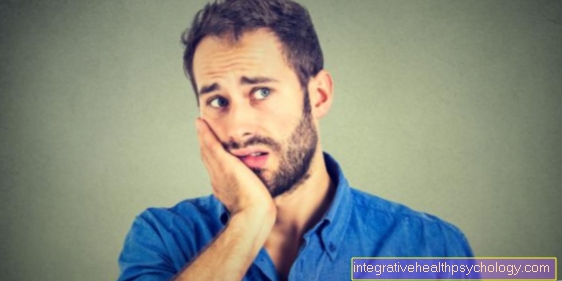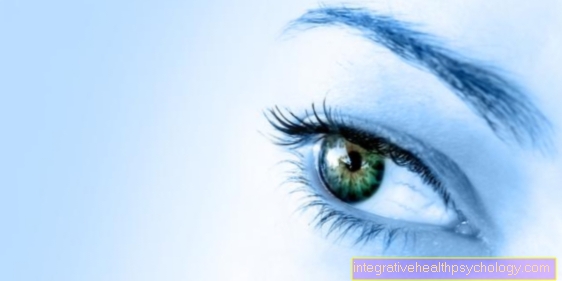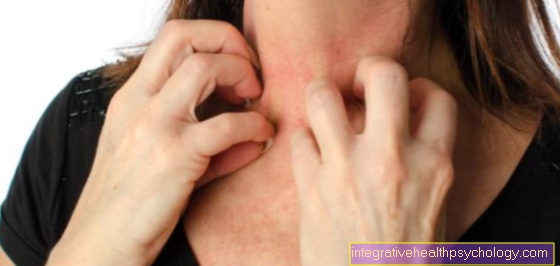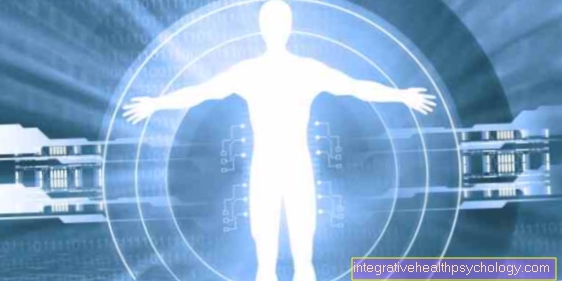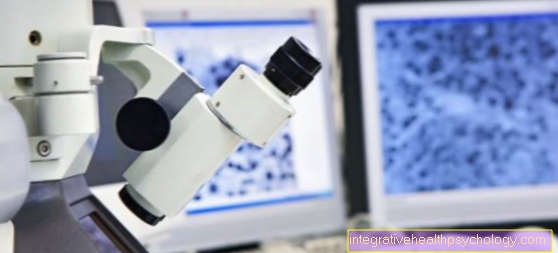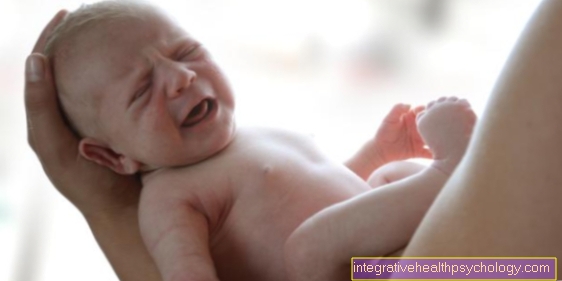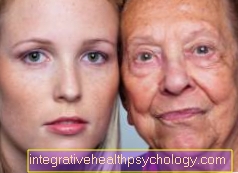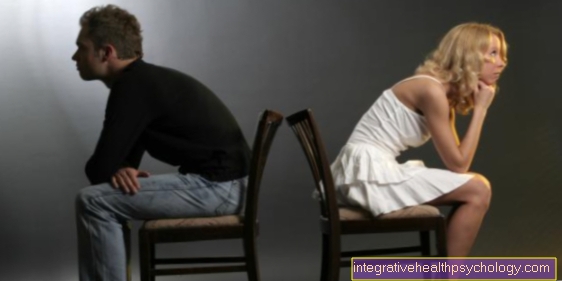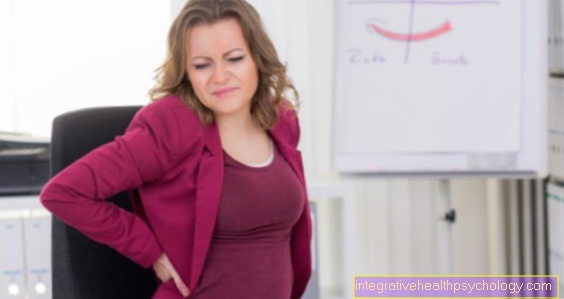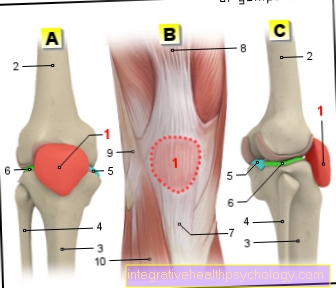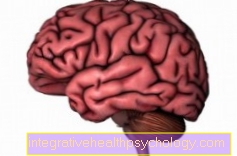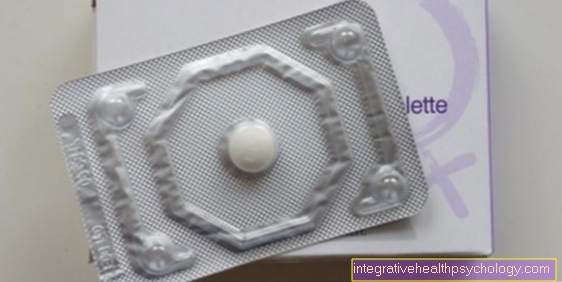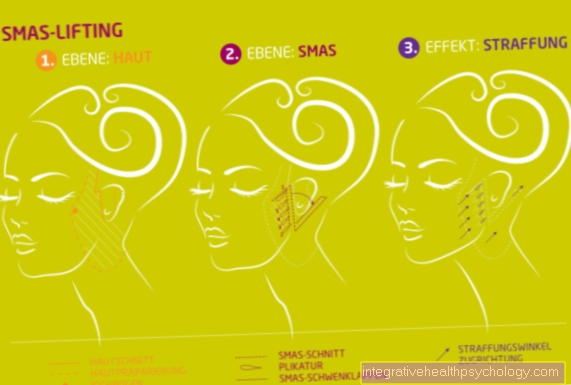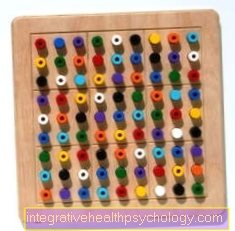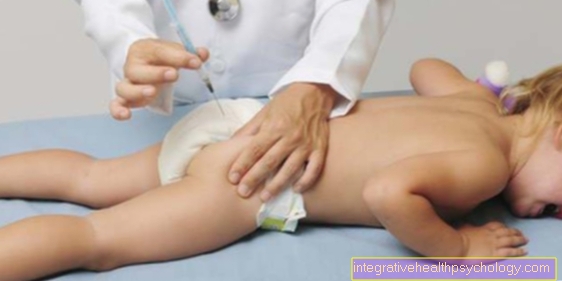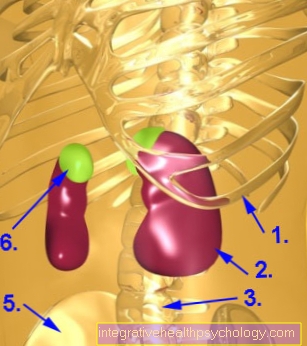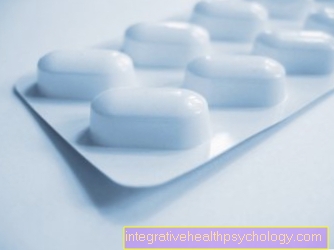Balance disorder and dizziness
introduction
dizziness (Vertigo) arises from an imbalance in the interaction of the individual sensory modalities that are involved in a regular orientation in space.
During a Dizziness the feeling
- the environment revolves around him,
- his body would fall
- rise or fall.
The causes of imbalance and dizziness are very different and sometimes difficult to see. They are often accompanied by headaches, nausea, tiredness, visual or hearing impairments and lead to high levels of suffering in those affected.
It is important for therapy to differentiate exactly what the root cause for the dizziness is. Possible causes are, for example, too high or too low blood pressure, neurological diseases, such as meningitis ("meningitis"), a migraine, tumors or strokes in the area of the cerebellum, but also ear or eye diseases.
Vestibular causes

Of the Vertigo has its cause in Inner ear (vestibular).
As a rule, this dizziness lasts minutes to hours and is also caused by vegetative symptoms such as
- Nausea,
- Nausea and one
- "Miserable" feeling (Nausea complex) accompanied.
In addition, the patients both complain of a constant annoyance Ringing in the ear (Tinnitus), as well as an increasing Hearing loss (Hypacusis). This clinical picture is called under the name Meniere's disease summarized.
The exact cause of this disease is not yet clear. Basically, the Dizziness from diseases of the ear arise. The affected patients have a resorption disorder of the endolymph in the semicircular canal (see also topic Balance organ). Due to the increase in volume, the membrane between the endolymphatic and perilymphatic space tears again and again.
Because the endolymph is very rich in potassium is, and this flows through the rupture of the membrane into the perilymphatic space, are temporary Potassium intoxicationsthat lead to the triggering of sensitive stimuli in a semicircular canal and thus trigger dizziness.
In 80-90% of cases, attacks no longer occur after 5-10 years of recurring attacks of dizziness. The disease stops spontaneously. Menière's disease can be treated curatively but not, only symptomatic therapies
- Antiemetics (suppress vomiting) and
- Sedatives (tranquilizers)
are possible to relieve symptoms during the attack.
Inflammation of the vestibular nerve (auditory and equilibrium nerves) can also trigger vertigo. This often occurs relatively suddenly and lasts for a few days. The cause is often a virus infection, which heals after a few days under physical therapy, which also stops the vertigo.
Read more on the topic: Viral infection
One speaks of benign (benign) paroxysmal positional vertigo occurring in attacks if:
- Vertigo occurs very suddenly,
- lasting a few seconds and
- only occurs when the head changes position.
The cause of this form of vertigo are small otolith particles that loosen in the semicircular canals and lead to the deflection of the sensory cells there when the position changes. When the head changes position, the otoliths slide around in the semicircular canal and trigger dizziness.
The diagnosis, as well as the therapy, is carried out through targeted positioning maneuvers. This is intended to wash the otoliths back into the utriculus and thereby remove them from the actual sensory cells. Circulatory disorders of the brain stem can also lead to repeated vertigo. Older patients in particular with accompanying symptoms such as:
- Double vision,
- Tendency to fall and
- nausea
should be examined immediately as a brainstem infarction may be present.
Both dizziness and the accompanying imbalance often occur with increasing age. For this reason, we advise you to read the following article: Dizziness in old age
Non-vestibular vertigo
A was standing- and Unsteadiness is also often called dizziness felt.
This would rather than Vertigo are designated and arises from:
- Spinal cord disease or one
- Polyneuropathy (Downfall of sensitive nerves, especially on the legs).
But also Intoxications (Poisoning) and some Medication can one Vertigo trigger. These drugs include:
- ß-receptor blockers
- Diuretics
- Antidepressants
- Anti-epileptic drugs
Very unsystematic dizziness, without a triggering situation, with varying duration of the vertigo, is often through General illnesses triggered. Especially one
- high blood pressure (arterial hypertension),
- Cardiac arrhythmias,
- Anemia (anemia) or
- Circulatory dysregulations (orthostatic dysregulation) can lead to dizziness
Please also read: Dizziness and circulation
In addition to these physical causes, can also mental illness lead to dizziness. Undirected, unsystematic dizziness can trigger the following diseases in particular:
- depressions,
- Anxiety disorders,
- somatoform disorders or
- acute stress reactions
What role does the cervical spine play
The cervical spine can play an important role in the development of dizziness and balance disorders. Most imbalances in the cervical spine can be traced back to muscular tension in the neck and shoulder area. However, diseases of the cervical spine, such as a tightness in the spinal canal, can lead to dizziness and impaired balance. Narrowing can damage various nerve cords that pull through the spinal canal into the brain. This in turn often leads to misinformation that reaches the brain. If the brain is supplied with different information by different sensory organs (for example through incorrect information from one organ), this can lead to balance disorders.
Concomitant symptoms
The classic accompanying symptoms of balance disorders and dizziness are complaints such as nausea and vomiting. Frequently, gushy, strong vomiting occurs immediately after an attack of dizziness. With certain diseases such as Menière's disease, ringing in the ears (tinnitus) can also occur. In addition, disturbances of balance often lead to an increased tendency to fall. Depending on the type of vertigo, this can be inclined in a certain direction. Due to the strong tendency to fall and the imbalance, there are changes in the gait pattern. Affected people walk less securely, sometimes they sway or can no longer walk straight ahead. In severe cases, walking or standing is no longer possible because of the dizziness. Other accompanying symptoms can be tiredness, headache and poor concentration. Loss of appetite often occurs due to the nausea in addition to balance disorders and dizziness.
Drowsiness with dizziness
Fatigue is often a consequence of dizziness attacks. Attacks of dizziness are often associated with high levels of suffering for those affected and are a major burden in everyday life. Sometimes those affected cannot sleep at night because certain movements can provoke dizziness. The result is difficulty sleeping through the night and falling asleep, which in the long run makes you feel tired and exhausted. But also low blood pressure often leads to tiredness and fatigue. In the latter case, it helps to get enough exercise and drink plenty of fluids to raise the blood pressure a little.
Dizziness and headache
Headaches can often accompany problems with balance or attacks of dizziness. The most common cause of headaches is fluctuations in blood pressure. Low blood pressure can cause people to go black, lose their balance, feel sick, and develop headaches. The cause is a reflex expansion of the cerebral vessels in response to the drop in blood pressure in order to ensure adequate blood flow to the brain. It usually helps those affected to sit down or lie down for a moment, put up their legs or have a drink.
Read more on this topic: Dizziness and headache
But blood pressure that is too high can also lead to headaches, and can also cause visual or hearing disorders, nausea, unsteady gait and dizziness.
Please also read: Dizziness and blurred vision
Another cause of headaches, related to dizziness and balance disorders, can also be a severe migraine, as well as other neurological diseases, such as a cerebral haemorrhage, a stroke or a brain tumor. Sudden or prolonged, very severe headaches that are associated with balance disorders or dizziness should always be clarified by a doctor as a precaution.
Dizziness and nausea

Nausea is a classic accompanying symptom of dizziness and is often accompanied by seizure-like vomiting in the case of balance disorders.
Nausea often occurs with neurological diseases, for example a stroke or a severe migraine, but also with diseases of the ear, nose and throat tract. Nausea is very common in connection with attacks of dizziness, for example in Meniere's disease, but also in vestibular neuritis - an inflammation of the auditory and equilibrium nerves, in which the balance organ fails. Both diseases are often associated with hearing impairment, dizziness and a tendency to fall.
Another harmless cause of nausea and dizziness are kinetoses. Kinetosis, also known as seasickness, irritates the organ of equilibrium as a result of unfamiliar movements, for example when reading while driving or on ships. Against nausea and dizziness, drugs from the group of antiemetics (against nausea) and antivertiginosa (against dizziness) are particularly helpful. Some preparations can be bought in pharmacies without a prescription. Long-term nausea combined with vertigo attacks, however, should always be clarified by an ENT doctor and neurologically.
Read more on the topic: Dizziness with nausea.
Tinnitus
Tinnitus usually refers to a whistling noise in the ear, which usually occurs in one ear (sometimes on both sides at the same time). It is not uncommon for tinnitus to also lead to balance disorders. This is due to the fact that the auditory and equilibrium organs are close together in the inner ear. Therefore, damage to the area can lead to hearing and balance dysfunction. The typical illness associated with dizziness and tinnitus is Meniere's disease. In addition, there is often a significant hearing loss on the affected side. Circulatory disorders and infections with subsequent inflammation can damage both sensory organs at the same time and thus lead to balance disorders, dizziness and tinnitus. This combination of symptoms can, depending on the cause of the symptoms, go away quickly or it lasts for a longer period of time and recurs in the form of attacks over a longer period of time.
Dizziness after stroke
A stroke is a sudden circulatory disorder in the brain, which can be triggered, for example, by small blood clots in the brain vessels. As a result, the brain areas supplied by the affected vessels are no longer supplied with blood, so that they do not function adequately. This often leads to misinformation from various sensory organs, which can lead to balance disorders and dizziness. In addition, movement disorders of one arm and / or one leg on one side can occur, which can also lead to gait disorders.
Dizziness during pregnancy

Dizziness and imbalance are very common, especially at the beginning of pregnancybecause the body has to get used to the hormonal changes. In particular, the increased progesterone during pregnancy leads to a relaxation of the muscles, which means that pregnant women often become dizzy if they get up too quickly.
Pregnant women often experience a rapid drop in blood sugar because the body first has to get used to the change. A low blood sugar can also lead to dizziness and nausea. The attacks of dizziness are harmless in themselves and should not be a cause for alarm. It often helps to sit down or lie down, put your legs up and yourself to restIt is also always recommended enough to drink. However, should the mother have any cause for concern or concern, the midwife or doctor can always be consulted.
In the last trimester, the so-called "Vena-Cava Compression Syndrome ". This is a condition that occurs when pregnant women turn on their back or right side in the last trimester. Due to the weight of the baby, the great vena cava ('Vena cava ") pulled the trigger and there is a disturbed blood return to the heart. In the case of the mother, this is mostly expressed through Dizziness, nausea, and racing heart. In the child, squeezing the vena cava can lead to an insufficient supply of oxygen. Therefore, at the end of pregnancy, you should be careful not to lie on your back. However, some women tolerate this well and have no problems. This is due to individual anatomical conditions.
Another condition that can cause severe headaches and dizziness is that pre-eclampsia. Preeclampsia is a form of pregnancy poisoning that is very severe increased blood pressure, headache, blurred vision and water retention in the body and can be life-threatening under certain circumstances. Admission to hospital should be considered if preeclampsia is suspected.
Diagnosis
A complete diagnosis should always be made for an exact diagnosis physical examination be performed. especially the
- Blood pressure and
- Heart rate measurement,
- Blood sugar control,
- Examination of eye movements,
- Balance and
- Hearing checks should be tested.
If no cause could be found here, a further examination is often with one Neurologist or neck- Noses- Ears- doctor necessary. Here, the vestibular and central system can be examined more specifically using imaging procedures or tests.
therapy
Above all, non-directional, unsystematic dizziness requires therapy for the underlying disease, for example thorough blood pressure control. Here, special therapy must be given individually and depending on the underlying cause.
In most cases, positional vertigo can be easily treated with the above-mentioned positioning maneuvers, while Menière's disease can only be treated symptomatically.
Also read: Medication for dizziness
These drugs can help
The therapy of balance disorders is initially based on the underlying cause. Exercise therapy often plays a more important role than drug treatment. Nevertheless, different drugs can be used symptomatically. These include, for example, the antivertiginosa (anti-vertigo drugs) with antihistaminic or anticholinergic agents. Antihistamines include, for example, dimenhydrinate, diphenhydramine and betahistine. In the case of pronounced dizziness, so-called benzodiazepines can also be taken in the acute phase of dizziness. Typical examples of this are diazepam and clonazepam. The benzodiazepines have a sedating (dampening) effect and as a result of this effect can also develop an anti-dizziness effect. However, some affected people also react in the opposite way and have increased dizziness due to the benzodiazepines. Other medications can be used if the shingle is triggered by infectious pathogens that lead to inflammation of the balance organ (labyrinthitis). In this case, bacterial infections can be treated with various antibiotics.
Further information on this topic can be found at: Medication for dizziness
Summary
The vertigo is a very complex Symptom with numerous causes and clinical pictures. Because of this, the thorough anamnese and a precise description of the vertigo from the patient is essential. Once the cause has been found, the dizziness can be treated in many cases, as there is often one treatable underlying disease present. In most cases, vertigo that cannot be treated causally can only be treated symptomatically in order to alleviate accompanying symptoms such as nausea and vomiting.


